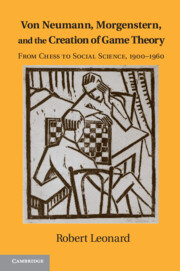Book contents
- Frontmatter
- Contents
- Acknowledgments
- Von Neumann, Morgenstern, and the Creation of Game Theory
- Introduction
- Part One Struggle and Equilibrium: from Lasker to von Neumann
- Part Two Oskar Morgenstern and Interwar Vienna
- Part Three From War to Cold War
- 9 Mathematics and the Social Order
- 10 Ars Combinatoria
- 11 Morgenstern's Catharsis
- 12 Von Neumann's War
- 13 Social Science and the “Present Danger”
- Conclusion
- Bibliography
- Index
- Plate section
Conclusion
Published online by Cambridge University Press: 05 December 2013
- Frontmatter
- Contents
- Acknowledgments
- Von Neumann, Morgenstern, and the Creation of Game Theory
- Introduction
- Part One Struggle and Equilibrium: from Lasker to von Neumann
- Part Two Oskar Morgenstern and Interwar Vienna
- Part Three From War to Cold War
- 9 Mathematics and the Social Order
- 10 Ars Combinatoria
- 11 Morgenstern's Catharsis
- 12 Von Neumann's War
- 13 Social Science and the “Present Danger”
- Conclusion
- Bibliography
- Index
- Plate section
Summary
That the image with which we finished our story is so similar to the one with which we opened it provides a certain closure to this account. We began with figures clustered over the chess tables of Germany and the Austro-Hungarian Empire. In this cultural setting, the gameplay of the chessmasters inspired literary treatments, provoked psychological investigations, and provided a point of departure for a nascent mathematics of strategy. This was broached in the writings of Emanuel Lasker and became an object of mathematical treatment at the hands of Borel and von Neumann. Thirty years later, on the West Coast of the United States, the gameplayers at RAND are once again clustered around the chessboard – playing Kriegspiel, gathered over the map playing wargames. Although the world has changed and the context is different, Homo Ludens is still trying to have the “game” reveal its secrets about the world.
Similarity of those images notwithstanding, the historical path connecting them departed quickly from the chessboard, showing the creation of game theory to have been a rich, multifaceted story, defying any easy classification. Only in part can it be described as history of economics, for it also owes much to debates on the nature and significance of modern mathematics; the great events in the political and social history of the interwar period; and the biographical accidents and psychological proclivities of our main protagonists. Indeed, so deeply was it rooted in the events, debates, and tragedies of the period that the creation of game theory may be taken as a parable for the first half of the twenthieth century.
- Type
- Chapter
- Information
- Von Neumann, Morgenstern, and the Creation of Game TheoryFrom Chess to Social Science, 1900–1960, pp. 344 - 346Publisher: Cambridge University PressPrint publication year: 2010

